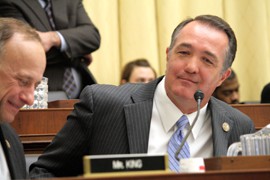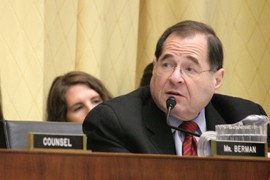Cronkite News has moved to a new home at cronkitenews.azpbs.org. Use this site to search archives from 2011 to May 2015. You can search the new site for current stories.
Committee OKs Franks’ bill to outlaw abortions based on race, gender
WASHINGTON – A House committee Thursday approved a bill to ban abortions based on the gender or race of the child, a practice that Rep. Trent Franks, R-Glendale, called one of the greatest threats to civil rights in the country.
“The effort of this bill here is to simply say that we cannot discriminate against unborn children subjected to abortion,” said Franks, the sponsor of the bill. “Somehow it seemed like we could come together on that.”
But opponents questioned whether race- or sex-selection abortions are actually happening, and they said the bill would do the opposite of what its supporters claim, by making it harder for poor and minority women to get health care.
“The African American and Hispanic communities are underserved when it comes to prenatal care, maternal and child health care services,” said Rep. John Conyers, D-Mich., at a hearing on the bill last week. “By every measure, our community is medically underserved and 3541 (the bill) is only reinforcing it.”
Thursday’s House Judiciary Committee vote followed a week of jockeying on the Prenatal Nondiscrimination Act, with Democrats trying with little success to amend the measure. The final vote split along party lines, with 20 Republicans voting for it and 13 Democrats voting against.
The bill would make it illegal to knowingly perform sex- or race-selection abortions or to coerce a woman to undergo such a procedure. It also sets civil and criminal penalties for the action and requires that doctors and nurses report known or suspected cases of selection abortions, among other provisions.
Opponents charged that the bill would be almost impossible to enforce, and they accused Franks of using its discrimination claims merely as a vehicle for an anti-abortion agenda. Franks said the issue of race and gender discrimination in abortions is real – but he agreed with critics that he has an anti-abortion agenda and the bill is part of that.
“If Planned Parenthood and the abortion clinics continue to serve the underserved like they’ve been doing, then pretty soon there won’t be any underserved to serve,” Franks said at one of the earlier hearings on the bill.
The committee met three times, with Democrats offering amendments to do everything from delaying its effective date, addressing employment discrimination against pregnant women and creating an “Office of Pregnant Women,” among others.
Ultimately, the only successful amendment was one to strip the names “Susan B. Anthony and Frederick Douglass” from the title of the bill.
“This is an insult to the memory of two giants in our history,” Rep. Mel Watts, D-N.C., said last week. “To try to drag them down into some current-day debate about whether abortion or life begins at conception or viability, when that wasn’t even an issue when they were around, is just an abomination in my opinion.”
By Thursday, most of the debate was over and the bill was approved in less than two hours of batting back amendments.
Douglas Johnson, federal legislative director for the National Right to Life Committee, said he was not surprised by Democrats’ repeated amendment attempts.
“Opponents of the bill wanted to talk about everything but the actual practice of sex-selection abortions in the United States,” he said.
Johnson said when similar legislation was introduced in the early 1980s, “there was a lot of pooh-poohing that this was even happening in the United States.” But Pennsylvania and Illinois have since banned sex-selection abortions and Arizona outlaws both race- and sex-selection abortions, which has increased awareness.
“It’s getting pretty difficult for people to deny it’s going on,” Johnson said. He claimed that is particularly true among some ethnic groups where it is culturally desirable to want a boy instead of a girl.
“I don’t think anyone, including Mr. Franks, is holding out for this to be a cure-all,” Johnson said. “But (the bill would) make it less common rather than make it more prevalent.”
Johnson would not predict whether Franks’ bill would ultimately pass.
“My crystal ball is in the shop,” he said. “There are a number of different measures that are under consideration in various committees.”








